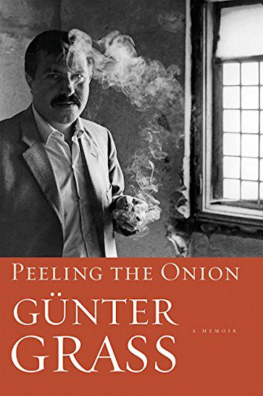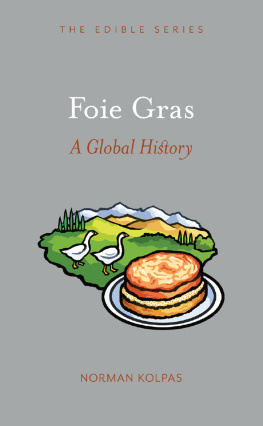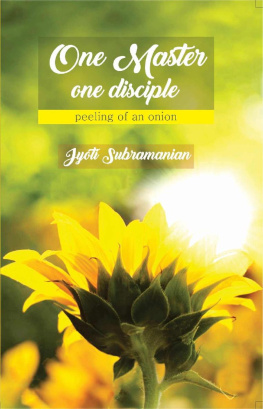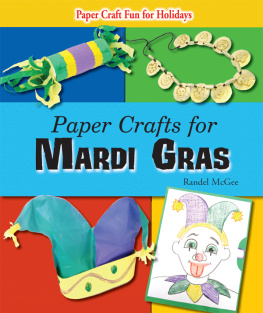Günter Gras - Peeling the Onion
Here you can read online Günter Gras - Peeling the Onion full text of the book (entire story) in english for free. Download pdf and epub, get meaning, cover and reviews about this ebook. year: 2007, publisher: Harcourt, Incorporated, genre: Non-fiction. Description of the work, (preface) as well as reviews are available. Best literature library LitArk.com created for fans of good reading and offers a wide selection of genres:
Romance novel
Science fiction
Adventure
Detective
Science
History
Home and family
Prose
Art
Politics
Computer
Non-fiction
Religion
Business
Children
Humor
Choose a favorite category and find really read worthwhile books. Enjoy immersion in the world of imagination, feel the emotions of the characters or learn something new for yourself, make an fascinating discovery.
- Book:Peeling the Onion
- Author:
- Publisher:Harcourt, Incorporated
- Genre:
- Year:2007
- Rating:4 / 5
- Favourites:Add to favourites
- Your mark:
- 80
- 1
- 2
- 3
- 4
- 5
Peeling the Onion: summary, description and annotation
We offer to read an annotation, description, summary or preface (depends on what the author of the book "Peeling the Onion" wrote himself). If you haven't found the necessary information about the book — write in the comments, we will try to find it.
Peeling the Onion — read online for free the complete book (whole text) full work
Below is the text of the book, divided by pages. System saving the place of the last page read, allows you to conveniently read the book "Peeling the Onion" online for free, without having to search again every time where you left off. Put a bookmark, and you can go to the page where you finished reading at any time.
Font size:
Interval:
Bookmark:
This ebook is copyright material and must not be copied, reproduced, transferred, distributed, leased, licensed or publicly performed or used in any way except as specifically permitted inwriting by the publishers, as allowed under the terms and conditions under which it was purchased or as strictly permitted by applicable copyright law. Any unauthorized distribution or use of this text may be a direct infringement of the authors and publishers rights and those responsible may be liable in law accordingly.
Epub ISBN 9781409078074
Version 1.0
1 3 5 7 9 10 8 6 4 2
VINTAGE
20 Vauxhall Bridge Road,
London SW1V 2SA
Vintage is part of the Penguin Random House group of companies whose addresses can be found at global.penguinrandomhouse.com.

Copyright Gnter Grass 2007
English translation copyright Harcourt Inc., and Harvill Secker
Gnter Grass has asserted his right under the Copyright, Designs and Patents Act 1988 to be identified as the author of this work
First published with the title Beim Huten der Zwiebel in 2006 by Steidl Verlag, Gttingen
First published in Great Britain by Harvill Secker in 2007
www.penguin.co.uk/vintage
A CIP catalogue record for this book is available from the British Library
Peeling the Onion is a searingly honest memoir that evokes Grass modest upbringing in Danzig, his time as a boy soldier fighting the Russians and concludes with the writing of his masterpiece, The Tin Drum, in Paris.
Grass parents ran a corner shop, but his mother, whom he adored, encouraged him towards books and music. Like most of his peers, he joined the Hitler Youth and in 1944, when he was just 17, he was sent to the Eastern front with the Waffen SS and found himself facing Russian tanks and machine guns. Recovering from shrapnel wounds in a military hospital, he had the good fortune to be taken prisoner by the Americans.
In the aftermath of the war, following a stint as a miner, Grass survived by trading on the black market and resolved to become an artist, eventually enrolling at the Academy of Arts in Dsseldorf. While living as an artist in Berlin with his first wife Anna, a ballet dancer, he started to concentrate on writing poetry. It was after the couple moved to Paris that the first sentence of the novel he had been determined to write and that would make his reputation came to him: Granted: I am an inmate of a mental hospital.
Peeling the Onion is the story of a remarkable life and is, without question, one of Gnter Grass finest works.
Gnter Grass (19272015) was Germanys most celebrated post-war writer. He was a creative artist of remarkable versatility: novelist, poet, playwright, essayist, graphic artist. Grasss first novel, The Tin Drum, is widely regarded as one of the finest novels of the twentieth century, and he was awarded the Nobel Prize for Literature in 1999.
A LSO BY G NTER G RASS
The Tin Drum
Cat and Mouse
Dog Years
The Plebians Rehearse the Uprising
Four Plays
Speak Out!
Local Anaesthetic
From the Diary of a Snail
Inmarypraise
In the Egg and Other Poems
The Flounder
The Meeting at Telgte
Headbirths
Drawings and Words 19541977
On Writing and Politics 19671983
Etchings and Words 19721982
The Rat
Show Your Tongue
Two States One Nation?
The Call of the Toad
My Century
Too Far Afield
Crabwalk
Dedicated to everyone from whom I have learned

Translated from the German by
Michael Henry Heim


TODAY, AS IN years past, the temptation to camouflage oneself in the third person remains great: He was going on twelve, though he still loved sitting in his mothers lap, when such and such began and ended. But can something that had a beginning and an end be pinpointed with such precision? In my case it can.
My childhood came to an end when, in the city where I grew up, the war broke out in several places at once. It began with an unmistakable bang the broadsiding of a ship and the approach of dive-bombers over the Neufahrwasser dock area, which lay opposite the Polish military base at Westerplatte, and, farther off, the carefully aimed shots of two armoured reconnaissance cars during the battle for the Polish Post Office in the Old Town of Danzig and was heralded closer to home by our radio a Volksempfnger, peoples receiver which stood on the sideboard in the living room. Thus the end of my childhood was proclaimed with words of iron in a ground-floor flat of a three-storey building on Labesweg, in Langfuhr.
Even the time of day sticks in my mind. From then on, the airport of the Free State near the Baltic Chocolate factory handled more than just civilian planes. From the skylight in the roof of our building we could see smoke mounting duskily over the Free Port each time there was a new attack and a light wind from the north-west.
But the moment I try to remember that distant artillery fire from the Schleswig-Holstein, which had been retired from active duty after the Battle of Jutland and could no longer be used as anything but a training ship for cadets, and the layered sounds of the Stukas or Stutzkampfflugzeug, dive-bombers so called because high above the combat zone they would tip to one side, then lunge down on their target, releasing their bombs at the last moment I am faced with a question: Why go back to my childhood and its clear and immutable end date, when everything that happened to me between milk teeth and permanent ones my first day at school, scraped knees, marbles, the earliest secrets of the confessional and later agonies of faith all merged in the jumble of jottings that has since been associated with a person who, no sooner had he been put down on paper, refused to grow and shattered all manner of glass with his song, kept two wooden sticks at the ready, and thanks to a tin drum made a name for himself that thereafter existed in quotable form between book covers and claims immortality in heaven knows how many languages?
Because this as well as that deserves to be part of the record. Because something flagrantly significant could be missing. Because certain things at certain times fell into the well before the lid went on: the holes I left uncovered until later, growth I could not halt, the linguistic give-and-take I had with lost objects. And let this, too, be said: because I want to have the last word.
M EMORY LIKES TO play hide-and-seek, to crawl away. It tends to hold forth, to dress up, often needlessly. Memory contradicts itself; pedant that it is, it will have its way.
When pestered with questions, memory is like an onion that wishes to be peeled so we can read what is laid bare letter by letter. It is seldom unambiguous and often in mirror-writing or otherwise disguised.
Font size:
Interval:
Bookmark:
Similar books «Peeling the Onion»
Look at similar books to Peeling the Onion. We have selected literature similar in name and meaning in the hope of providing readers with more options to find new, interesting, not yet read works.
Discussion, reviews of the book Peeling the Onion and just readers' own opinions. Leave your comments, write what you think about the work, its meaning or the main characters. Specify what exactly you liked and what you didn't like, and why you think so.













